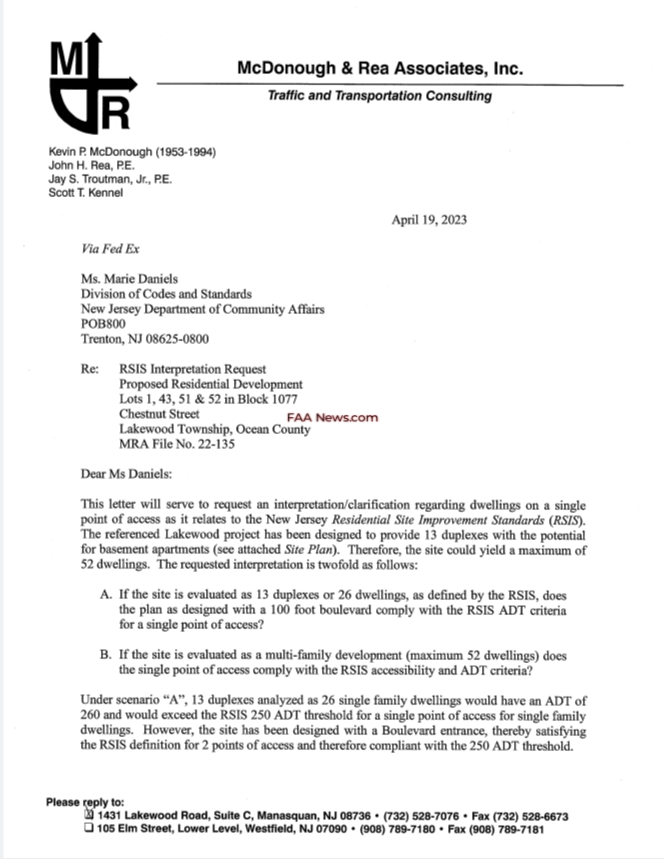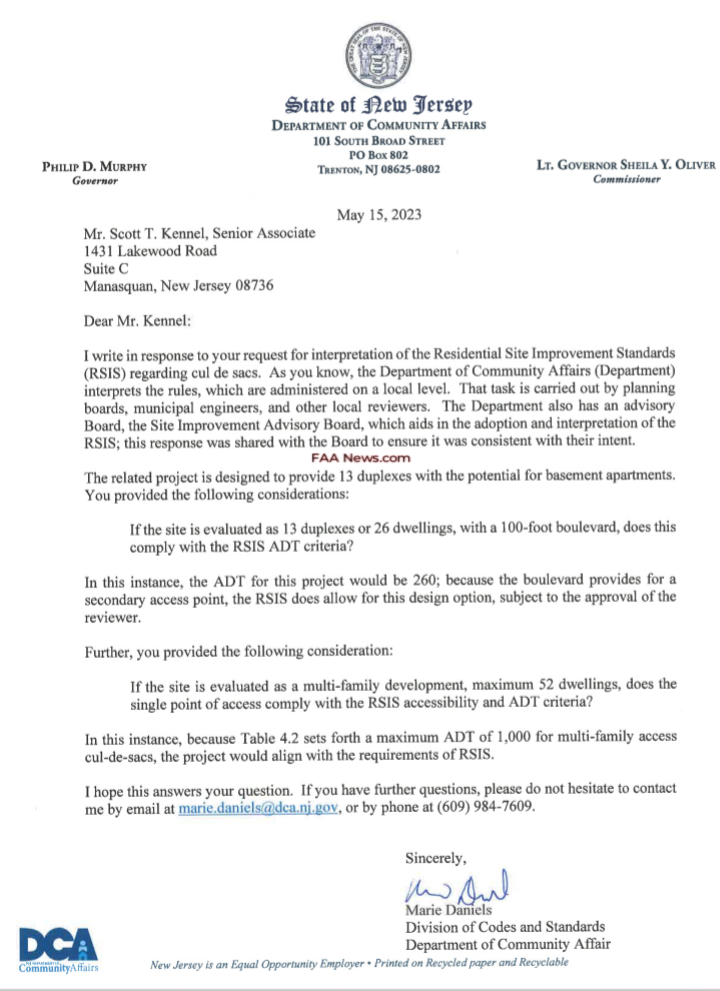Due to heavy opposition from numerous neighbors who demanded a shul and a playground, Lakewood Township's Planning Board tonight denied an application to construct 13 duplex structures (26 houses plus basement apartments) on a new cul-de-sac bulb off of Chestnut Street, across from Evergreen Avenue.
The application in question is Applicable SD 2553, submitted by Chestnut Holdings (which is owned by Jacob Lipshitz and Hersh Eissenberg).
The lots are located in the HD-7 zone which conditionally permits duplexes on lots with a minimum area of 8,500 sq feet and a minimum width of 60 feet. This application conforms to the standards for the conditional use.
At the previous public hearing on this application, Board Engineer Terry Vogt stated that the application proposes for the driveways to all 26 units to be accessed from one single cul-de-sac, which was not in accordance with the New Jersey Residential Site Improvements Standard (RSIS) which requires an additional secondary access road for cul-de-sacs with more than 24 single family or duplex units.
RSIS permits cul-de-sacs with no secondary access road only for roads with an "Average Daily Trips" count of 250. RSIS also counts 10.1 Average Daily Trips for single family homes or each part of a duplex home, so more than 24 homes would tally more than 250 Average Daily Trips.
In response, Engineer Brian Flannery representing the applicant suggested that they will "work around this issue" by widening the cartway width to 40 feet wide and installing a boulevard at the intersection, and that is sufficient as RSIS does permit more than 24 homes on a block as long as you widen the cartway width to 40 feet wide and install a boulevard at the beginning of the road.
Board Member David Helmreich pushed back, saying that this application should require a secondary access road.
Board Chairman Moshe Neiman agreed, and noted that because these homes will include basement apartments, we should calculate the Average Daily Trips for the basement apartments as well and with that, 52 families will generate way in excess of 250 Average Daily Trips.
Mr. Flannery attempted to push back, saying, "this isn't 52 units, it's 26 units with additional basement apartments."
Board Member Yair Stern waived him away, saying "if we had a secondary access road then we could have an argument as to whether or not the basements count, however now you're coming to us with a little bit of magic and also asking us to ignore the basements, and we can't do that all on one single roadway."
Board Engineer Terry Vogt suggested that the applicant flip the driveways of the 2 corner units so they front on Chestnut Street instead of the new cul-de-sac bulb, and in this way the cul-de-sac will not serve more than 24 units.
Mr. Neiman turned down that suggestion, noting that Chestnut Street is a major corridor and additional driveways directly onto that roadway is not a safe idea.
At the end of the day, the Board decided to table the application so they can reach out to the RSIS board and seek clarification as to 1) what is the Average Daily Trips for a home with a habitable basement? (In essence, does this application count as 26 units or 52 units), and 2) does a boulevard satisfy the requirement for a secondary access, or if an actual second road is required, and if a boulevard is sufficient, how far into the property is it required.
Subsequently, Scott Kennel on behalf of the developer sent a letter to the New Jersey Department of Consumer Affairs (DCA) seeking an interpretation. Mr. Kennel's letter was reviewed and approved by the Board Attorney and Board Engineer.
The DCA has now responded that the application does meet RSIS guidelines for a "Multi-family development" and no secondary access road is required.
As such, despite the unhappiness of the Board (especially Mr. Helmreich), the Board was forced tonight to approve the application as presented.
As such, despite the unhappiness of the Board (especially Mr. Helmreich), the Board was expected tonight to approve the application as presented.
However, numerous neighbors opposed the application, citing traffic safety concerns as well as the lack of a playground and shul, which is sorely needed here as all nearby amenities are full to capacity.
A resident of Blue River Way told the Board that he is a car crash victim and that if this application is approved, it will definitely lead to additional car crashes.
In response, the applicant's professionals testified that in lieu of the Township's 5% Open Space for applications with developments with more than 25 units, they will provide a $500 payment in lieu per unit. [Related reading: Lakewood Planning Board discusses issue of developers sneaking out of providing shuls and playgrounds, and Developer used loopholes to get away from providing a soul and a playground. At least the Board finally demanded a cul-de-sac bulb.]
After continued pushing from the Board and neighbors, the applicant's professionals offered to eliminate one house (i.e. one side of a duplex unit) to provide open space for the new development. Attorney Pfeffer also warned the Board that they eliminated every variance so it's a fully conforming application and therefore the Board lacks jurisdiction to deny the application.
The Board did not waiver, but rather insisted that they can not approve the application without an actual shul and playground, and without the boulevard being extended all throughout the entire roadway. Unable to muster a motion to approve the application, the Board ultimately voted to deny the application.
As previously reported here on FAA News, this is not the applicant's first attempt to get this duplex cul-de-sac approved.
To join a FAA WhatsApp Group, click here.
To join the FAA WhatsApp Status, click here.





2 comments:
Like everything in this town, it's all about who you know. Other developments with bigger issues get approved easily.
ab,
You're mistaken. This applicant is a known developer who has built all over Lakewood and got away with lots of shtick.
When it came to this neighborhood, the neighbors were paying attention and understood the disaster he wanted to bring upon them. They got together and spoke their minds and did a good job in persuading the board members. Neighbors are fine with regular development. They're not fine with OVER-development.
This proves that even "experienced" developers can be beaten back when they get greedy with their proposals.
So, let's keep these over-developers in check and stop allowing them to continue getting away with unfairly making millions at the expense of our quality of life. Hatzlocha to all.
Post a Comment